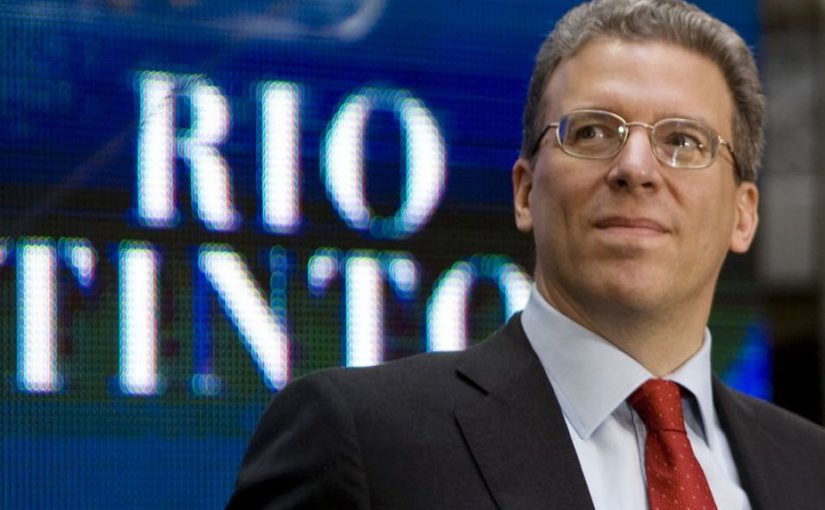Mozambique LNG project nears restart as HD Hyundai, Samsung await $20 billion carrier orders
Rio Tinto and former bosses charged with fraud by US regulator over Mozambique coal

Reuters (File photo) / Tom Albanese was Rio Tinto's chief executive between 2007 and 2013.
Rio Tinto and its former chief executive and chief financial officer have been charged with fraud by US authorities for allegedly attempting to cover up multi-billion-dollar losses on an African coal investment.
The $US3.7 billion purchase of Mozambique coal assets in 2011 had already cost then chief executive Tom Albanese his job, when Rio Tinto was forced to write-off more than $US3 billion from the value of its investment in January 2013.
The US Securities and Exchange Commission today said Rio ended up selling the Mozambique assets for just $US50 million in 2014.
However, it is not the value destruction that has triggered fraud charges against Rio Tinto, Albanese and his then chief financial officer Guy Elliott.
Rather, it is an alleged failure to follow accounting standards and hide or delay disclosure of the mounting losses.
“Rio Tinto and its top executives allegedly failed to come clean about an unsuccessful deal that was made under their watch,” said Steven Perkin, the SEC’s co-director of enforcement.
“They tried to save their own careers at the expense of investors by hiding the truth.”
Rio Tinto, Albanese and Elliott are charged with violating the anti-fraud, reporting, record keeping and internal control provisions of federal securities laws.
The SEC is seeking permanent injunctions, return of allegedly ill-gotten gains with interest, civil penalties from all defendants and to bar Albanese and Elliott from serving as public company officers or directors.
Rio Tinto shareholders do not appear too worried by the case, with the company’s shares off 0.2 per cent to $71.30 by midday (AEDT).
Investors allegedly misled over subsidiary worth -$US680m
After Rio Tinto bought the Mozambique coal assets from Riversdale in 2011, the SEC alleges that the project suffered setbacks almost immediately.
The SEC case contends that Rio and its senior executives soon became aware there was less coal and of a lower quality than they had previously thought, and that an application to barge the coal to port for export had been rejected by Mozambique authorities.
The regulator argues that, having already twice written down the value of Rio’s disastrous Alcan acquisition, the two executives knew that disclosing the Mozambique failure would call into question the company’s business model.
The SEC further goes on to state that Rio Tinto raised $US5.5 billion from US investors — including $US3 billion that was raised after May 2012, when executives from Rio Tinto Coal Mozambique (RTCM) had allegedly told Mr Albanese and Mr Elliott that RTCM was likely worth negative $US680 million.
The US regulator is arguing that the alleged fraud was only uncovered in January 2013 when an executive in Rio’s technology and innovation group discovered that the coal assets were being carried on the books at an inflated value and reported this to the company’s chairman Jan du Plesis.
The SEC said an internal review triggered by this report led to the RTCM assets finally being written down.
Rio Tinto, executives to ‘vigorously defend’ fraud charges
Rio Tinto said it intends to vigorously defend itself against these allegations.
“Rio Tinto believes that the SEC case is unwarranted and that, when all the facts are considered by the court, or if necessary by a jury, the SEC’s claims will be rejected,” the company noted in a statement to the Australian share market.
Mr Albanese and Mr Elliott are not speaking with reporters, but have denied the allegations.
“There is no truth in any of these charges,” Mr Albanese said in a statement.
“I echo Rio Tinto’s confidence that these will be proved baseless in court.”
“Guy also fully refutes these charges and will be vigorously contesting them,” said a spokesperson for Mr Elliott.
After leaving Rio Tinto, from March 2014 until August 2017 Mr Albanese was chief executive of London-listed Indian firm Vedanta Resources.
Rio Tinto said it had separately reached a settlement with the United Kingdom’s Financial Conduct Authority (FCA) in relation to the timing of the announcement writing down the value of the Mozambique assets in January 2013.
The FCA determined that Rio Tinto should have carried out an impairment review in relation to Mozambique as part of its 2012 interim results, which would have exposed the write-downs about six months earlier.
The FCA determined that Rio had breached the UK’s disclosure and transparency rules and fined the company 27.4 million pounds.
Rio Tinto said the FCA made no findings of fraud or any systemic or widespread failure by the company.
The Australian Securities and Investments Commission is also reviewing the Mozambique write-downs, according to Rio Tinto.
By Michael Janda













Leave a Reply
Be the First to Comment!
You must be logged in to post a comment.
You must be logged in to post a comment.